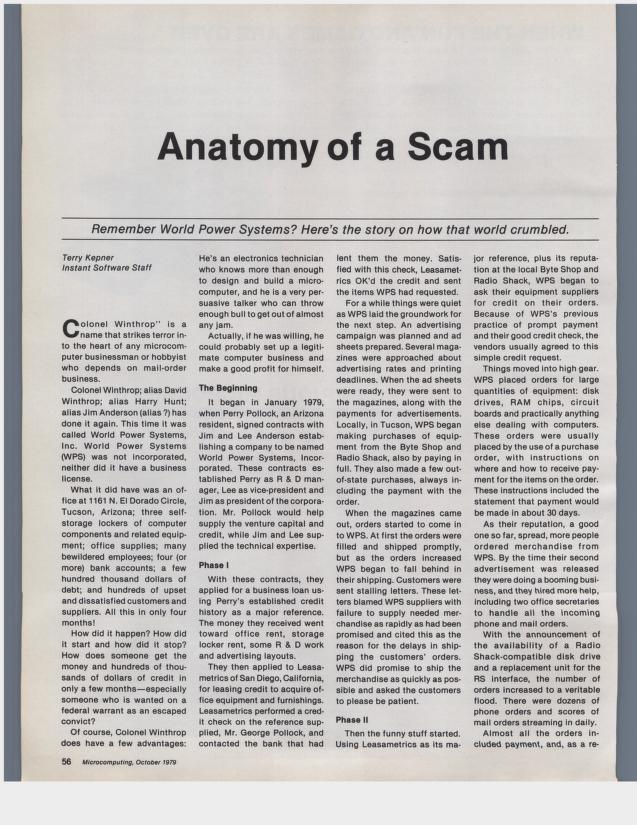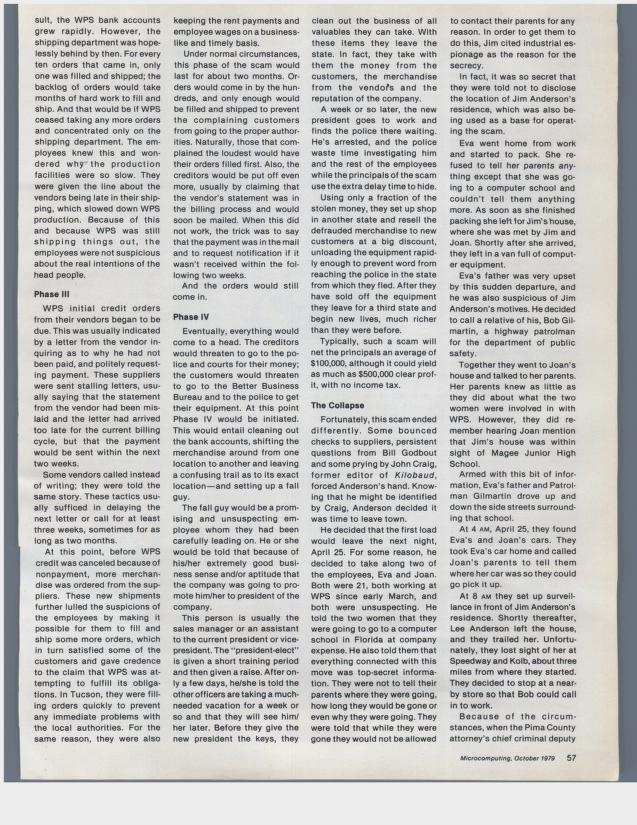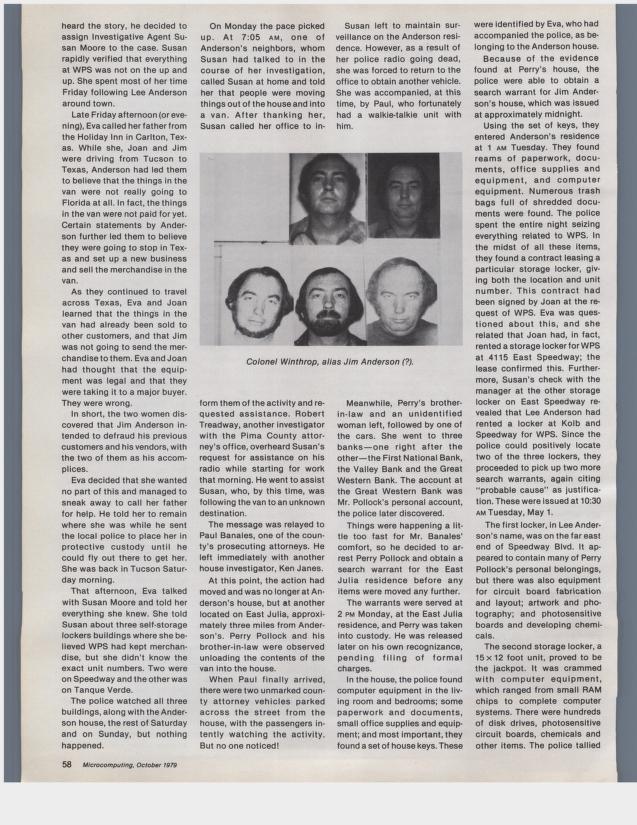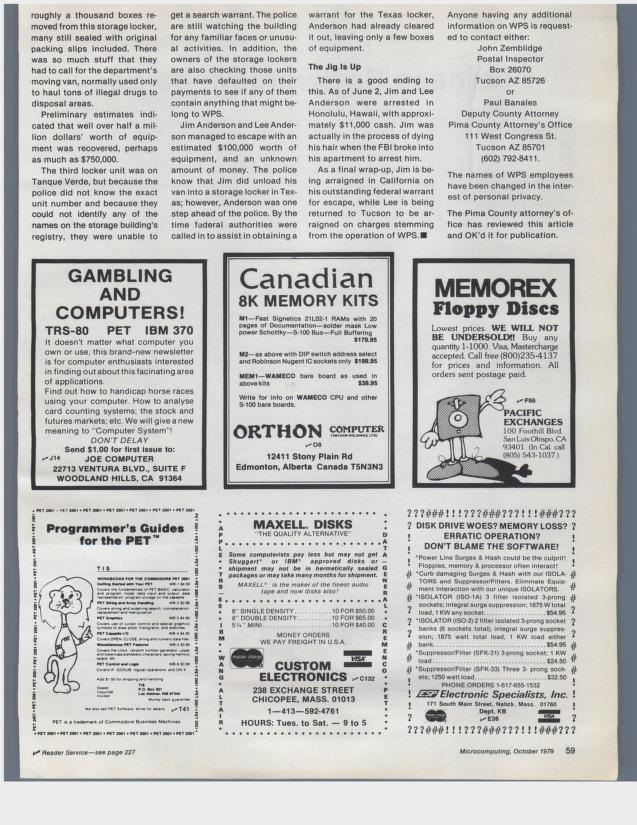Forgotten Fraud: The World Power Systems Scam
- Transfer
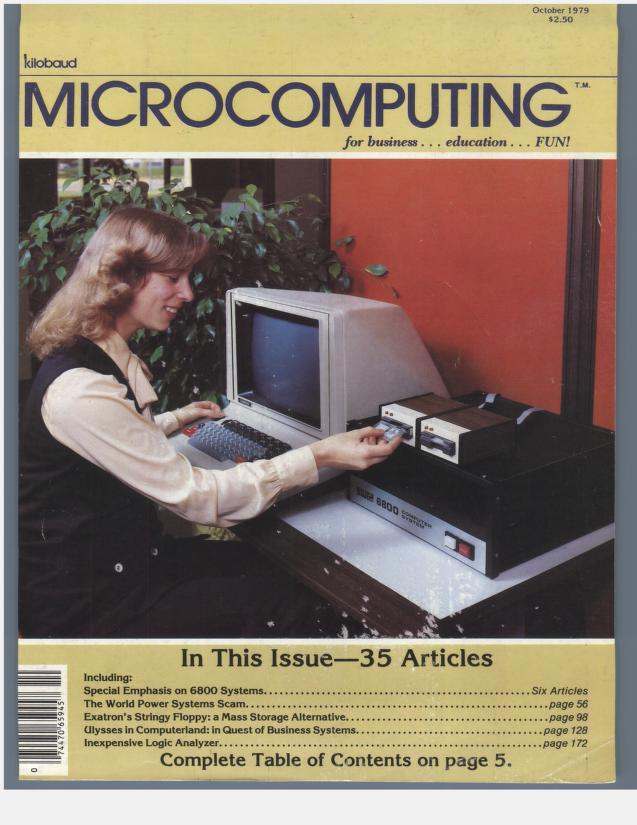
In 1977, the personal computer (then it was called so - a microcomputer) turned only three years old, the original Apple II was only going to start a serial sale, and with it to unleash the computer revolution, which we, computer users, know and love everything. But here, of course, there was not a terrible spoon of tar in this barrel of sweet computer honey, the burgeoning computer community was first shaken by a considerable scandal, and although at that time it seemed that the name of Norman Henry Hunt would be covered with shame forever, 40 years later crimes are almost forgotten.
So, let's take a walk through the back streets of computer history and recall World Power Systems and Norman Hunt’s crimes against very young computer enthusiasts.
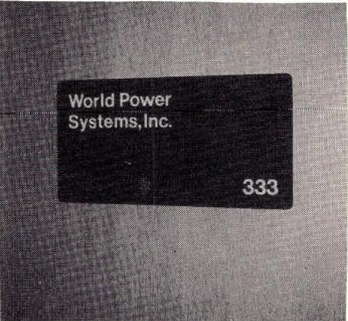
The first IT fraud with significant financial damage was committed by Norman Hunt in early 1977, when Hunt, under the assumed name Colonel David Winthrop, founded DataSync Corp, based in Santa Maria, California. Datasync company was aggressively advertised in young, but very popular computer magazines (they had a price of $ 2-3 per copy!), Such as Byte, Creative Computing and Kilobaud, where in ads with beautiful color photos Hunt offered to buy from him new equipment at incredibly low prices for that time. Hunt could calmly lure customers at any cost, because the equipment he was selling “virtually” in fact did not even exist.
Photo page 47 from Kilobaud magazine 1977, August.
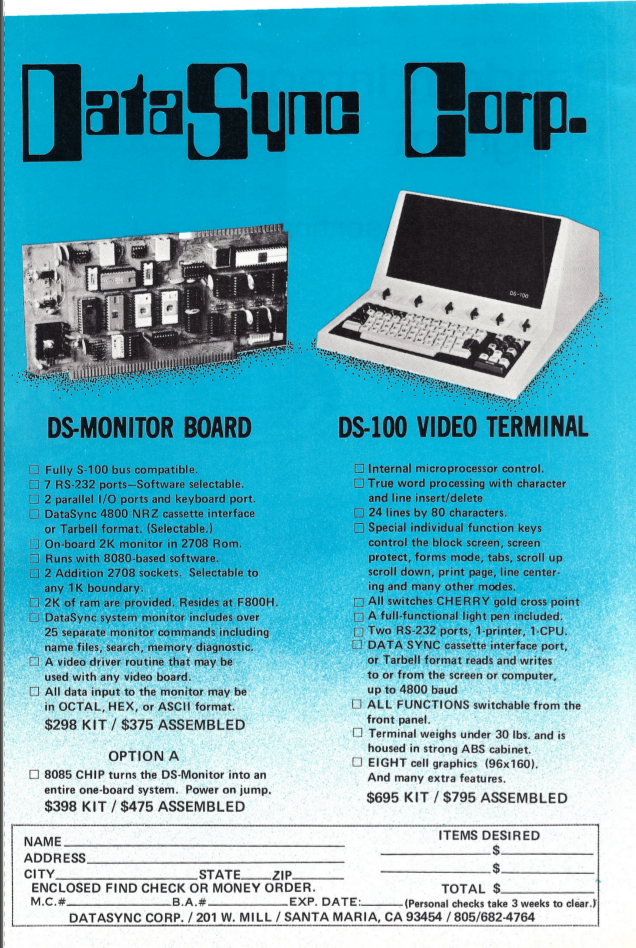
In June 1977, Hunt was arrested for fraud and sentenced to three years in state prison in Chino, California.
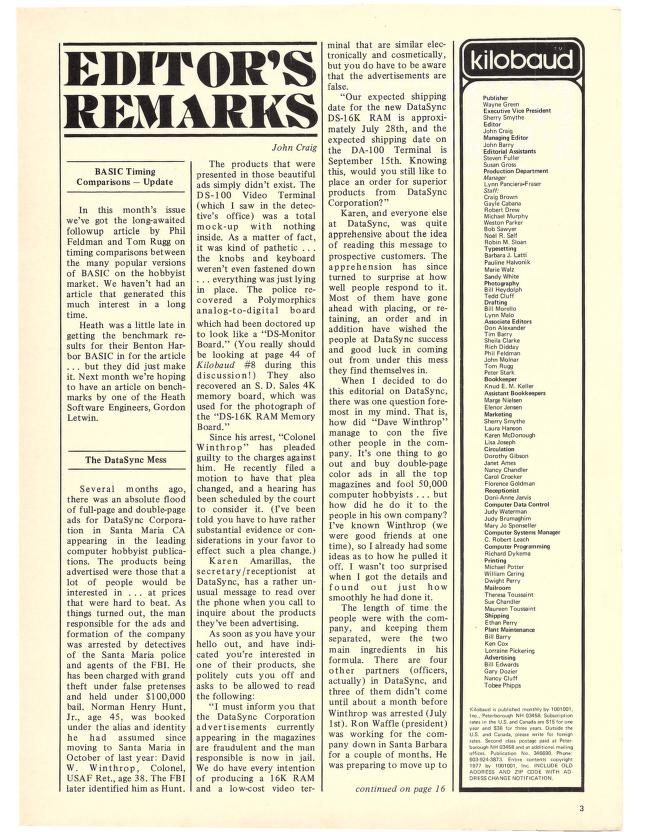
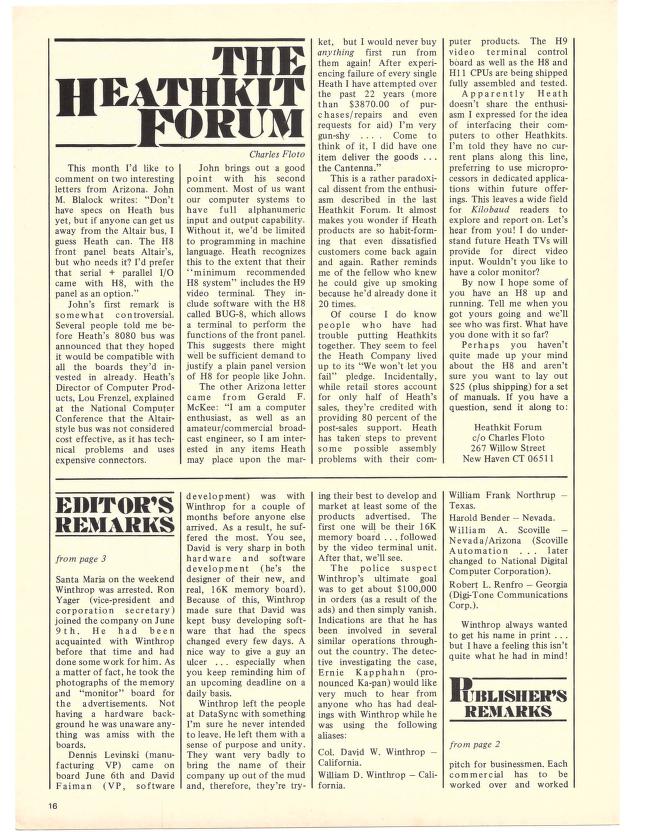
However, Hunt spent in prison less than six months out of three years put to him by sentence, and the police added his warning “a very persuasive person” to the police’s personal profile, because using something like NLP (neuro-linguistic programming), Hunt could to persuade the prison authorities to transfer him to a remote prison department with a minimum level of protection, from where he just left one fine day.
World Power Systems
Plans for Norman Hunt are now more ambitious. Hunt moved to the city of Tucson (660 km / 410 miles from Chino Prison), Arizona, and changed his name to Jim Anderson, he also met Perry Pollack, his next unwitting partner in further crimes, and together they founded World Power Systems.
Taking the bull by the horns again, Norman wanted to return to his old tricks again and start advertising the fictional equipment at incredibly low prices.
But some computer enthusiasts nevertheless became very suspicious, they noticed that the advertised equipment in photos in magazines and newspapers was collected incorrectly (especially with pictures with types and diagrams of printed circuit boards), and some devices did not even have the necessary contacts for power!
However, at that time many computer magazines were rarely published and their copies remained on sale for a long time, so for everyone who asked, this was explained by the fact that the photos are simply product layouts used for advertising, and not real equipment, so that these materials had time to get into the magazine early. But this method of deception has already ceased to be particularly profitable, as buyers of computer equipment became more suspicious and understanding in technology.
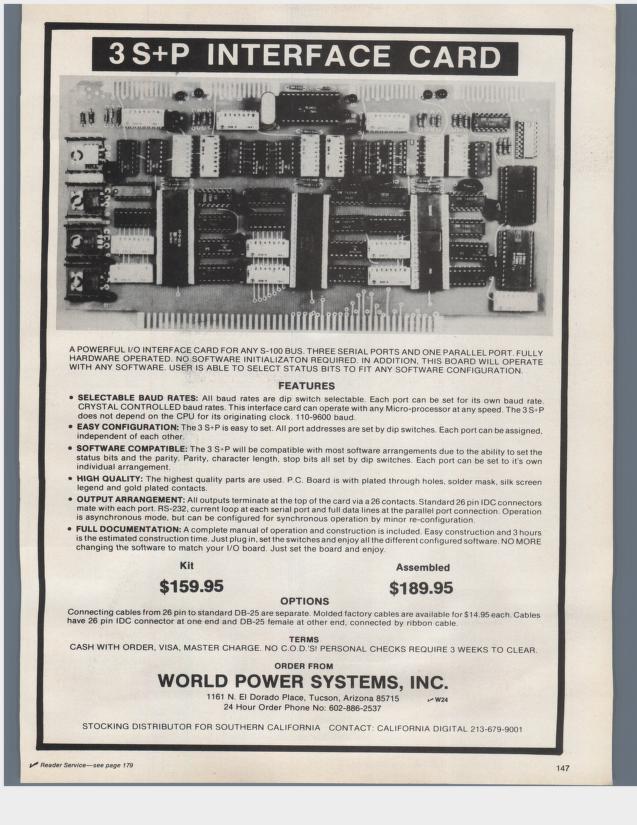
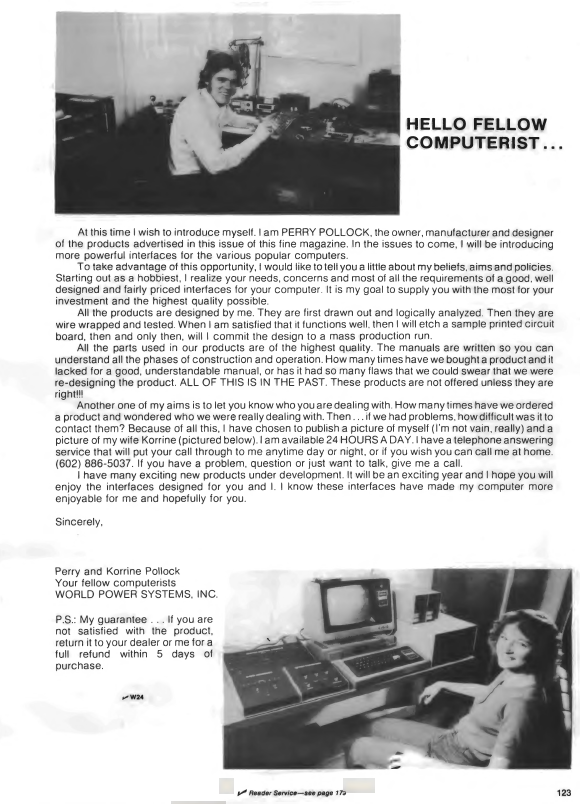
Some time after its foundation, World Power Systems worked to gain a good reputation, following all the laws and regulations, orders were received, they were quickly sent to customers, but as orders began to increase, Hunt began to implement new fraud schemes.
On behalf of World Power Systems, they were sent warning letters to customers, informing them that, unfortunately, customers could not receive their product on time, according to the contract, because the supplier did not have the right amount of equipment ordered at the moment. At the same time, World Power Systems began to request from its direct suppliers of equipment a delay in payments and even the possibility of supplying equipment on credit.

Since World Power Systems had a good reputation, suppliers usually agreed and came across a new Norman trick. As soon as the supplier agreed to lend to World Power Systems, Hunt placed large orders for expensive components, promising suppliers that payment for the orders would be made 30 days after delivery.
The company's warehouses were filled with equipment, and virtually nothing was shipped to customers, usually one out of ten orders was completely fulfilled in this scheme of deception, and this order was often from the pickiest customer who could go to the police or worse, complain to the BBB organization (Better Business Bureau) with the message of deception, and this could turn into scandals and arrests.
Only heels sparkle.
As well as Paulie could do anything. Especially to launder money with the institution. Why not? Take delivery at the main entrance and sell it cheaply at the back. Take a 200-dollar box of booze and drive it for 100. It does not matter. Profit is profit. And finally, when nothing is left, when you can no longer borrow from the bank, you close the place. You light a match.
- Good guys.
Norman Hunt’s fraud scheme was pretty simple, and this classic trick is called “tacking.” Every time Hunt implemented it, he followed this step-by-step scenario:
- It is necessary to establish a new company, at first play the business according to the rules, create for the company a solid reputation among customers and suppliers. Over time, start getting more equipment in a deferral or a loan and stop sending anything to customers from their orders.
- When customers start complaining, blame the suppliers. From time to time send the order to the meticulous customers themselves, so that they lag behind, so you can pull time to continue the fraud.
- Noyut customers need to milk suppliers to the maximum. Answer their questions about unpaid bills that they did not bill correctly or it came too late, and the billing cycle has already passed, but payment will be made later in two weeks. When it stops working, then lie that the payment was made, and finally give them a lie of all time, which often works: the check is stuck in the mail.
- Catch the moment when the supplier is determined to stop lending, and be sure to place with him the last largest order.
- Repeat steps 1-4 until the list of suppliers is exhausted.
When the situation in the company begins to worsen as much as possible and it seems that the house of cards is about to collapse, because creditors threaten to sue and customers call the police, Hunt quietly implements the next stage of his deception - he developed a strategy of withdrawal, which was almost the same insidious part of his fraud.
Hunt clears bank accounts of the company and transfers money to their accounts, complicates logistics and begins to move equipment to various difficult-to-track areas and hidden warehouses in order to maximize traces for the police, and, most importantly, find a scapegoat who will take all the blame for going on.
Hunt found a simple-minded employee in advance, whom he promoted to the post of president of the company, entrusting the company’s assets and preparing everything for the flight as much as possible. Hunt went on a long-term leave, giving the management of the company into the hands of the new president. And the Hunt with money and equipment disappeared from the state.
The police arrest the unaware president almost on his first working day and start investigating the fraudulent activities of the company, while Hunt got a good temporary head start for a quiet escape and continuing his dirty work in other states.
Collapse.
Covert becomes clear. John Craig, editor of Creative Computing, offered to meet with Hunt to discuss the new article, but it was a serious problem for Hunt, as he met with John while working at DataSync and knew that he would be identified by Craig as “Colonel David Winthrop And, more importantly, he is a fugitive.
The time has come once again to flee from fate, and on April 25, 1979, Hunt and his wife left Arizona.
Further, the plan of Hunt quickly began to collapse because of trifles and fellow travelers. For some reason, he decided to take with him two female employees, the sisters Eva and Joan Bof (these are the pseudonyms by which they appeared in the article about Hunt’s fraud in Kilobaud magazine), under the pretext that they go to the “Computer School” in Florida .
While they were traveling around Texas, the employees found out that the equipment that Hunt was also carrying with them in his van had already been resold to other customers, and that Hunt intended to deceive his customers and suppliers along with them as accomplices.
Eva was able to quietly reach the phone to call her father, who went to the local police authorities and arranged for both sisters to be taken under guard as important witnesses. As soon as Eva returned to Tucson, she told the local authorities everything she knew about Hunt’s plans, and most importantly, the exact location of the warehouses with the equipment where the stolen goods were stored by World Power System.
Hunt, at that time, managed to elude the authorities of Tucson, although he was eventually arrested in May 1979 in Honolulu, Hawaii, he was brought back to California, where he was charged with 14 counts of organizing fraudulent schemes, according to which he ended up was convicted.
As a result, the two-year fraud schemes brought Khant about 30,000 dollars (this is 102,000 dollars in 2018) for fraud through advertising and from 100,000 to 250,000 dollars (342,000 to 856,000 dollars for 2018) for stolen unpaid equipment from suppliers and oversold to other buyers. , such a fork in the amounts and figured, since all the totals from the injured clients who tried to purchase goods from his "company" were not fully known.
After a loud arrest and pronouncement of the verdict, Hunt was sent to the correctional center in San Diego, California, where he tried to demonstrate his communication skills and decided to become an informant.
For Hunt, such a change of prison role did not end very well, so he was transferred to the correctional center of Northern Nevada for defensive purposes, however, at that time he somehow managed to crank another scam, this time involving the prison guards, selling the supposedly working software, known as “Word Type,” which includes almost 100 different programs for only $ 109.95, so he found a new market for selling software air to naive users.
Any loser who bought this set of programs, if he nevertheless received a copy of them on his hands, found that these programs do not start at all or are renamed copies of existing programs.
After opening this scam, Hunt was transferred back to the correctional center of the city of San Diego in 1981, where the trail of his computer misadventures was completely lost.
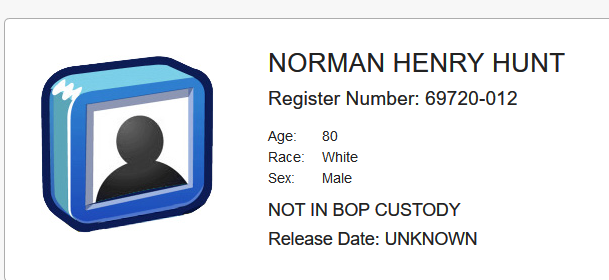
Link to Kilobaud magazine
Original article in Kilobaud magazine:
